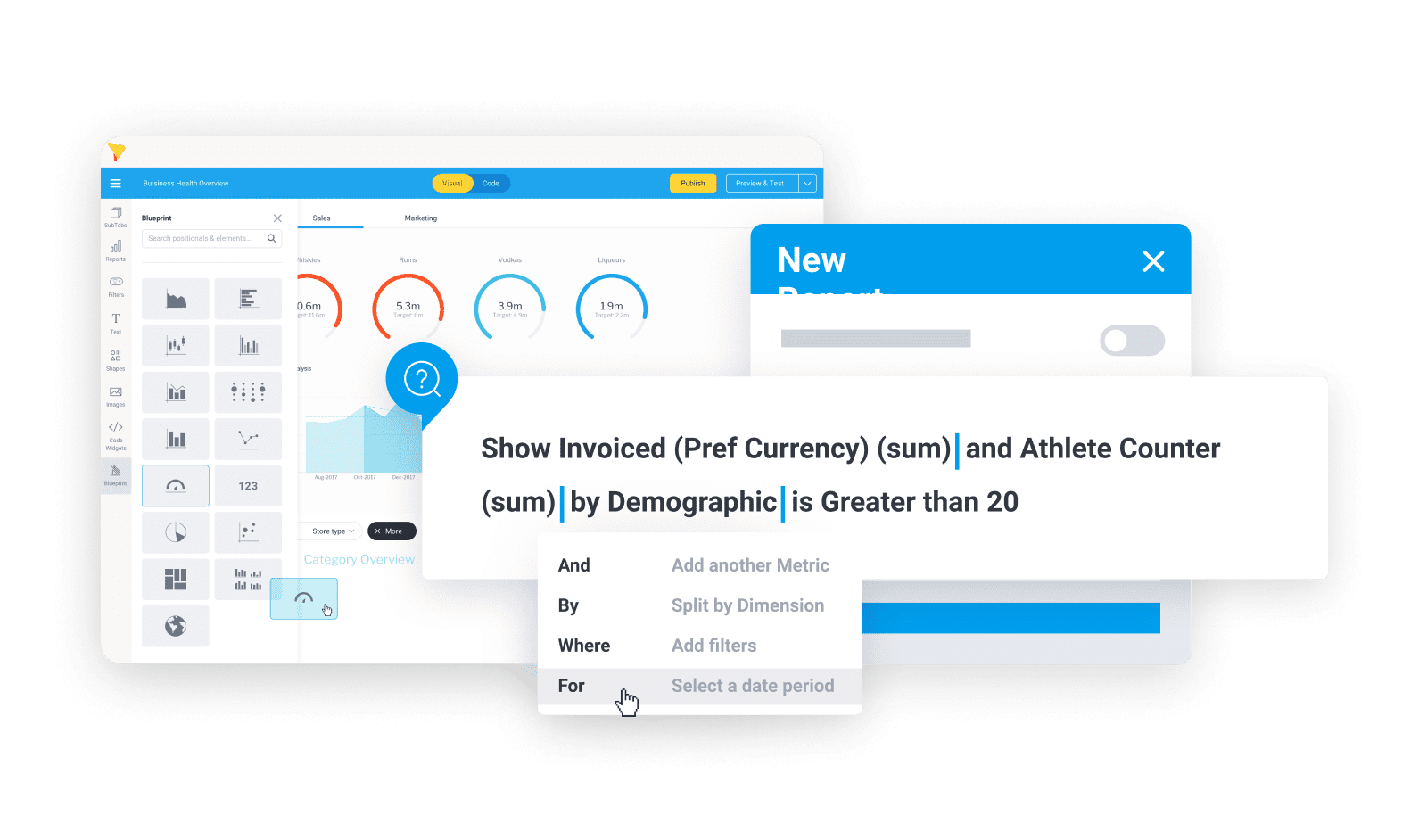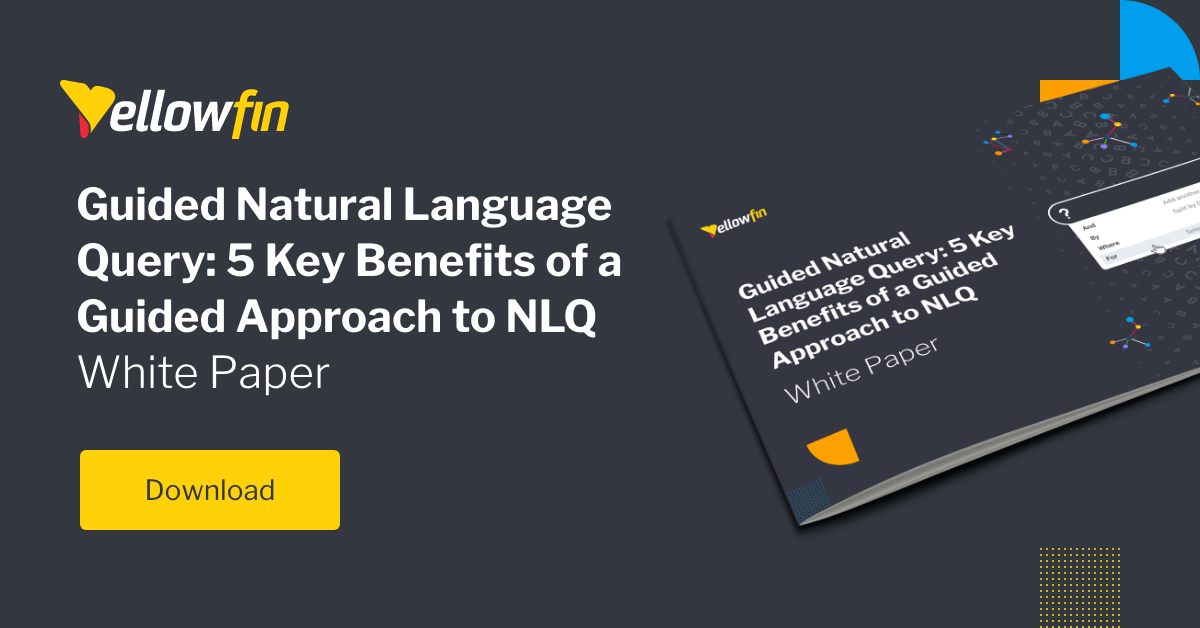
What is Natural Language Query (NLQ)?
TL;DR
NLQ lets business users type questions in plain English and get instant answers. This removes barriers to analytics adoption and democratizes data access. The tech behind NLQ combines search, AI, and semantic models to interpret intent. Yellowfin’s NLQ allows anyone, not just data experts, to ask, explore, and act on insights in seconds.
Try Yellowfin free
Providing your analytics users the ability to get answers from their data is useful, but only if the solution can guide them to ask the right questions.
The rising integration of artificial intelligence (AI) and machine learning (ML) in many business intelligence (BI) solutions has enabled new innovative approaches in combining natural language techniques with self-service analytics, resulting in helpful NLQ tools.
But what is natural language query, exactly, and why is it now important? Is it the same thing as typing in a question in a search engine, or something more? And how is it different from other natural language techniques out there? This article aims to explain its many nuances, and the unique NLQ solutions currently available from BI vendors.
Key takeaways of natural language query
- Traditional search-based natural language queries typically lead to uncertain and unrelated search outcomes.
- Natural language search requires users to face difficulties when expressing their questions properly.
- Users can use Guided NLQ to create queries step by step with an interactive guide, and newer tools such as Yellowfin AI NLQ to ask questions with the help of artificial intelligence to structure queries and generate answers on the user’s behalf.
- Users without expert knowledge obtain precise, relevant search results with this system.
- All users can access data exploration through Yellowfin's Guided NLQ feature.
How does NLQ transform modern analytics?
Natural language query (NLQ) is an augmented analytics (also called AI analytics) capability in BI software solutions that allows people to ask questions of data within their analytics platform, using everyday language as they would to another person, to find information they need to make business decisions. With NLQ, an analytics user does not need data analytics skills or need to use complex query language such as SQL or raw code to query their data - they can get started using basic, non-technical terminology.
Depending on the sophistication of the NLQ offering, analytics users can query data using terms either typed, or spoken into a search box. The BI system then parses for keywords, searches relevant databases and generates an answer, typically using a report or chart that attempts to answer the query, and ideally helps provide understanding. As a data querying tool, it essentially aims to simplify the data exploration process to better enable users to obtain insights effortlessly, so they can make better business decisions.

NLQ tools come in different forms and levels of integration, varying between software vendors. Some platforms incorporate voice interaction and queries through a virtual personal assistant, and support integration on mobile phones and other smart devices. NLQ can also be combined with conversational AI solutions, such as virtual artificial intelligence (AI) assistants, or AI chatbots.
NLQ sits under an umbrella of natural language technologies that enable new ways to not just communicate information between humans and systems, but explain data and analysis in a way that is accessible to those not as analytically inclined. The other fields of natural language commonly used in analytics include natural language processing (NLP), natural language generation (NLG) and natural language understanding (NLU) The best business intelligence software vendors combine these technologies into their NLQ and solution offering to help more people with better data querying and exploration.
What are the differences between NLQ, NLP, and NLU?
Natural language technologies are numerous, and it’s helpful to understand how they compare, and intersect, in BI tools today. Here are the major differences between NLQ, NLP, NLG, and NLU:
| NLQ (Natural Language Query) | NLP (Natural Language Processing) | Natural Language Generation (NLG) | NLU (Natural Language Understanding) |
| The system allows end-users to perform data inquiries through everyday speech. | System procedures and evaluates human language communications through AI technology | The system produces human-like text responses based on processed information. | The system understands the meaning and communicates in natural language. |
| The system translates questions from users into database query requests for obtaining information. | The algorithm converts textual data into organized statistical information for evaluation needs. | The system formulates coherent and contextually relevant textual output. | The system identifies the logical organization of queries in addition to their purpose and situational understanding. |
| The system enables users to pose questions through natural language structure in order to retrieve data query responses. | Through NLP, the system completes every language-related operation, including sentiment assessment and language translation. | Generates natural-sounding text to effectively convey information or insights. | Focuses on understanding user intent and context for smart responses. |
What is the purpose of using NLQ for BI?
The basis of natural language query would be familiar to anyone who has used Google.
You type in a set of keywords, and the system instantly matches them with relevant information found in related databases, providing a list of results with a set of answers.
In analytics, however, its core purpose is different.
Modern BI solutions combine NLQ with AI, machine learning and large language models (LLMs), made possible with recent advances in generative AI, for the purpose of assisting more non-technical people to analyze their business data easier and faster, as part of the ongoing augmented consumer trend. LLMs and consumer-facing Gen AI tools, such as ChatGPT and Google Gemini, have shown in recent years the benefit of exploring large data structures using interfaces that allow for conversational input and generate easy-to-understand answers. The graphical interface of the best natural language query tools is rapidly reflecting this approach with streamlined UIs and dynamic assistance that aims to further simplify data query capabilities and enhance accessibility between users and complex data collections.
NLQ is also another effective way to democratize self service analytics in the business and make more information accessible to more people, not just data experts or analysts who are searching for it, which is why it's now much more available.
In short, NLQ can help:
- Assist non-technical people by providing another way to explore their data
- Enhance other traditional analysis techniques, such as report building
- Make the use of analytics more pervasive throughout the organization overall
With NLQ, instead of having to manually dig into data or learn complex jargon, an analytics user can theoretically get started on their journey for answers by asking questions of the system directly, and get a relevant answer, rather than having to rely solely on finding answers in a traditional dashboard or chart - which not all non-technical BI users are able to do. This data querying method effectively complements other core BI reporting tools to make business insights available to all users.
NLQ’s overall rise in prominence comes as analytics vendors have begun to offer other modern tools to streamline the analysis process for all users, not just experts and analysts, including data storytelling and automated business monitoring.
What are the different types and examples of NLQ?
Since its mainstream inception into BI and analytics tools in the late 2010s, natural language query tools typically fall under three approaches. We break down the current types of Natural Language Queries below:
Search-based NLQ - This model functions exactly the same as traditional search engines. The user types the query, and the system matches the keyword with the relevant data.
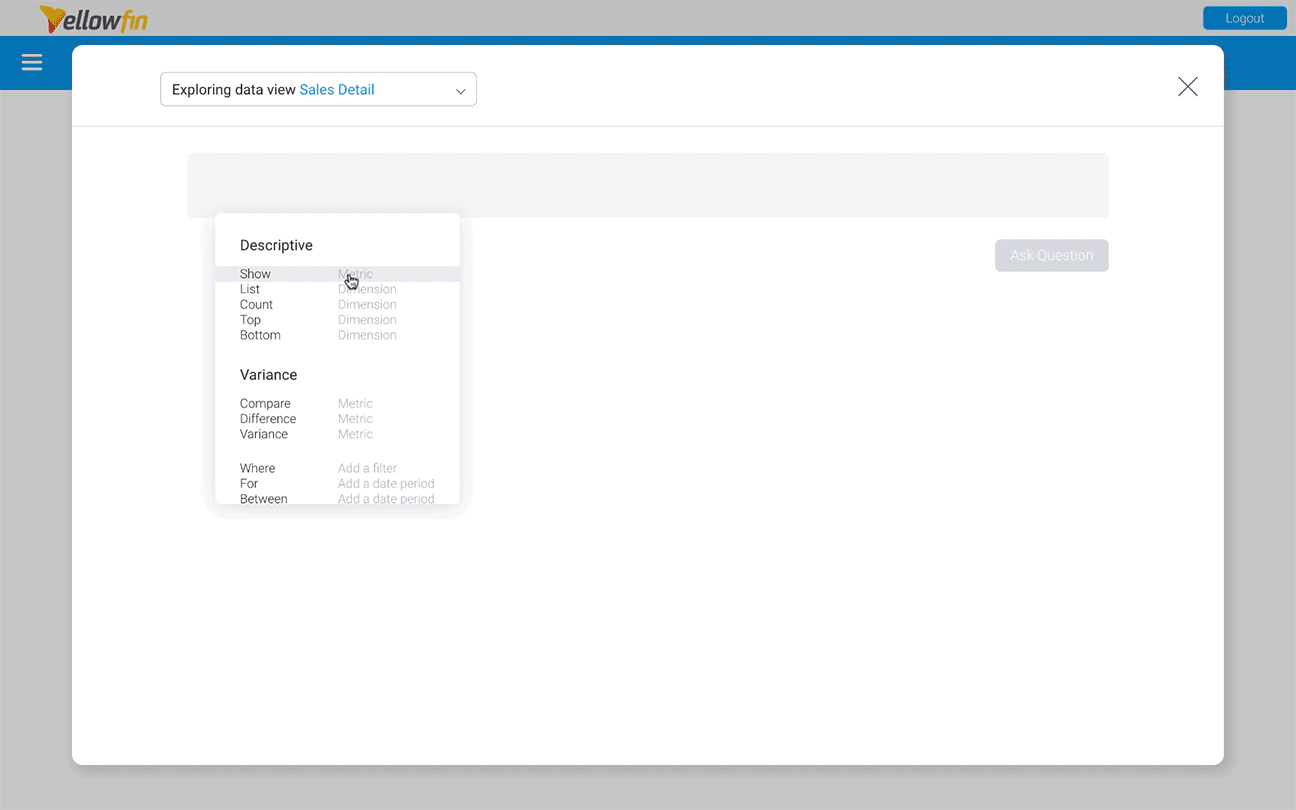
Guided NLQ - The accuracy of answers increases through the Guided NLQ model, with the NLQ system delivering smarter, dynamic query recommendations to users as they type their data query. This solution surpasses basic keyword matching because it guides users through an organized process of data query development. Guided NLQ is also the name of Yellowfin’s native natural language query tool, which pioneered the guided approach to natural language query on its original feature release in 2022.
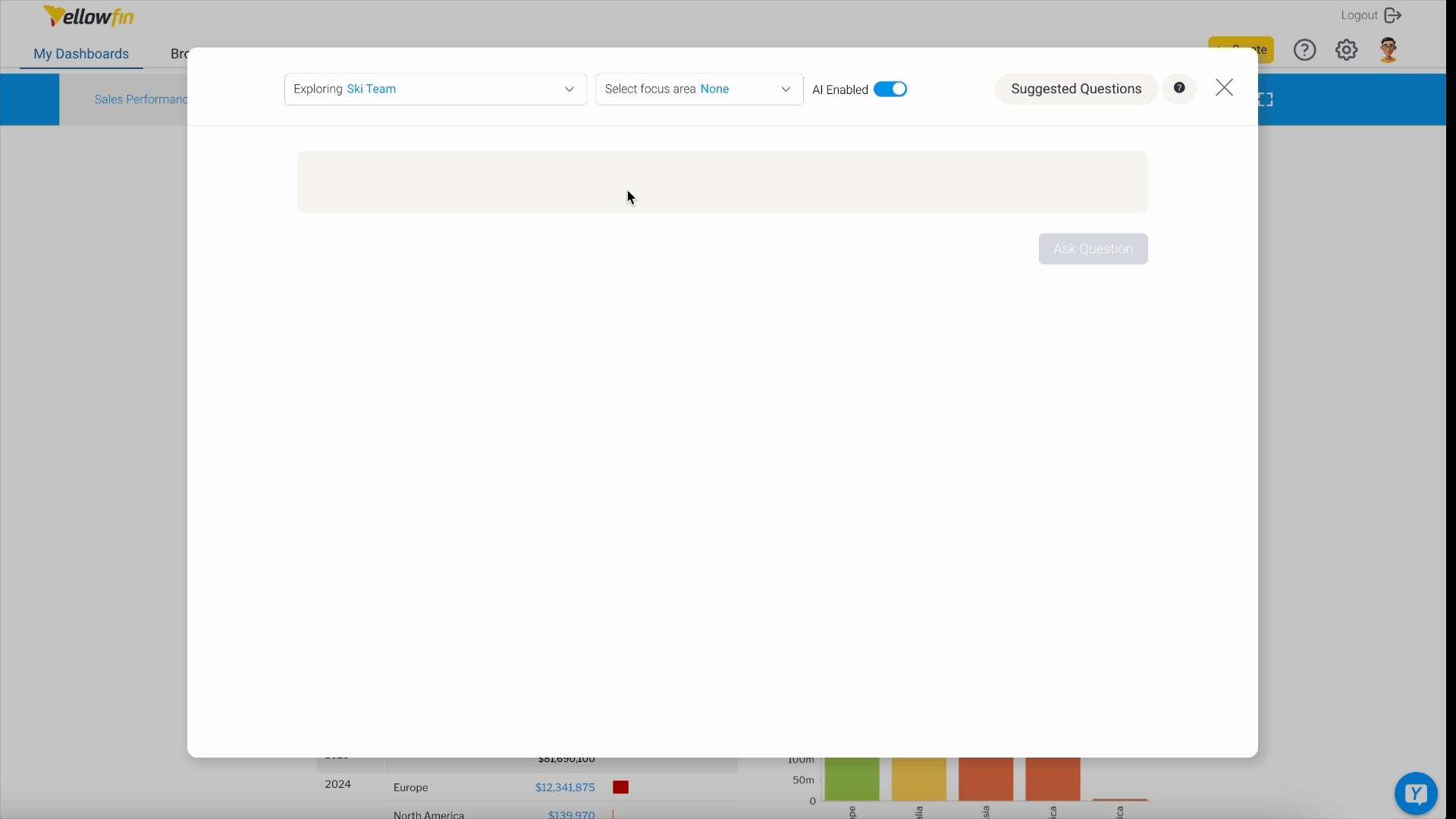
AI NLQ - Yellowfin AI NLQ is an exclusive feature of Yellowfin BI released in 2025 as part of the Yellowfin 9.15 release that uses generative AI and LLMs to further streamline the data querying process. With AI NLQ mode enabled, any user can type a question in the Yellowfin search bar using free text and have it automatically structured with the proper syntax, and generate an answer in the form of a best practice data visualization or tabular report. AI NLQ also provides users who don’t know what to ask with its "Suggested Questions" functionality, which instantly produces relevant questions from metadata to help business people with their data exploration. The tool serves two user groups by simplifying the data search process, which leads to improved analysis.
What are the key examples of NLQ?
Some of the examples of NLQ are mentioned below:
- Business platforms: Users can get immediate results for their business queries when they use the system to ask questions such as “Total sales for March?”
- Healthcare systems: Doctors within healthcare systems can quickly access patient data through a straightforward query such as “What are John’s lab results?” and have an answer generated and returned to them instantly.
- Financial analysis: Financial experts can generate immediate visual reports through queries that involve basic business statements such as “Compare Q1 and Q2 revenue.”
- Retail analytics: Sales optimization requires retail managers to explore their data-sets, and they can use NLQ tools to swiftly ask their systems, “Which products generated the highest return numbers last month?” and get the specific metrics faster and easier.
- Education platforms: Educational systems with NLQ tools made available can enable teachers and instructors to refine their inquiries about student performance throughout the previous semester or term, helping them deliver targeted results.
These examples are just some that showcase the potential use cases and benefits that natural language-based data querying can have for different businesses and industries.
Detailed overview: Natural language query: 5 benefits of Guided NLQ
What are the key considerations before implementing NLQ?
Implementing NLQ in business intelligence tools can be rewarding for organizations across all sectors. It allows teams to find valuable insights from a big database, just by asking a specific data query, and they do not even need to have technical knowledge or know technical terms such as SQL or code to begin asking questions of their data. NLQ implementations also save you a lot of time on finding answers from data, and help improve data-led decision-making and reporting efficiency in the long run.
Additionally, successful implementation of NLQ requires a clear understanding of the business goals and a well-defined data governance strategy. It's also essential to ensure that the system can be seamlessly integrated with existing tools and workflows to maximize its effectiveness.
However, before implementing NLQ in your system, it’s always important to evaluate factors such as data readiness, and considering your user base’s current data literacy, etc, for a successful deployment.
Read our blog to learn in-depth about the 3 must-know business considerations before you adopt NLQ.
What are the challenges in NLQ adoption?
The slow implementation of NLQ in today’s businesses is based on multiple factors, including ongoing challenges in implementing said tools within existing work software applications and getting customers to see value in its capability for their own daily workflows and processes.
Many modern NLQ tools are still largely search-based and display limitations when dealing with complicated multi-step data queries, which produce substandard, irrelevant, or inaccurate results. The production of misleading insights through search-based NLQ tools is a significant barrier to the adoption of NLQ because many users may perceive the unintuitive experience and poor data quality as a deterrent for adoption.
User resistance also continues to be a challenge for many businesses, since numerous professionals show a preference for standard BI dashboards instead of NLQ-based analysis tools. The limitation of customized options in NLQ solutions additionally hinders the technology’s effectiveness, since fundamental calculation and reporting tools are missing from these systems.
AI-based NLQ solutions, such as Yellowfin AI NLQ, now resolve these obstacles through substantial improvements in user accessibility, data accuracy, and usability, and deeper compatibility with BI platforms.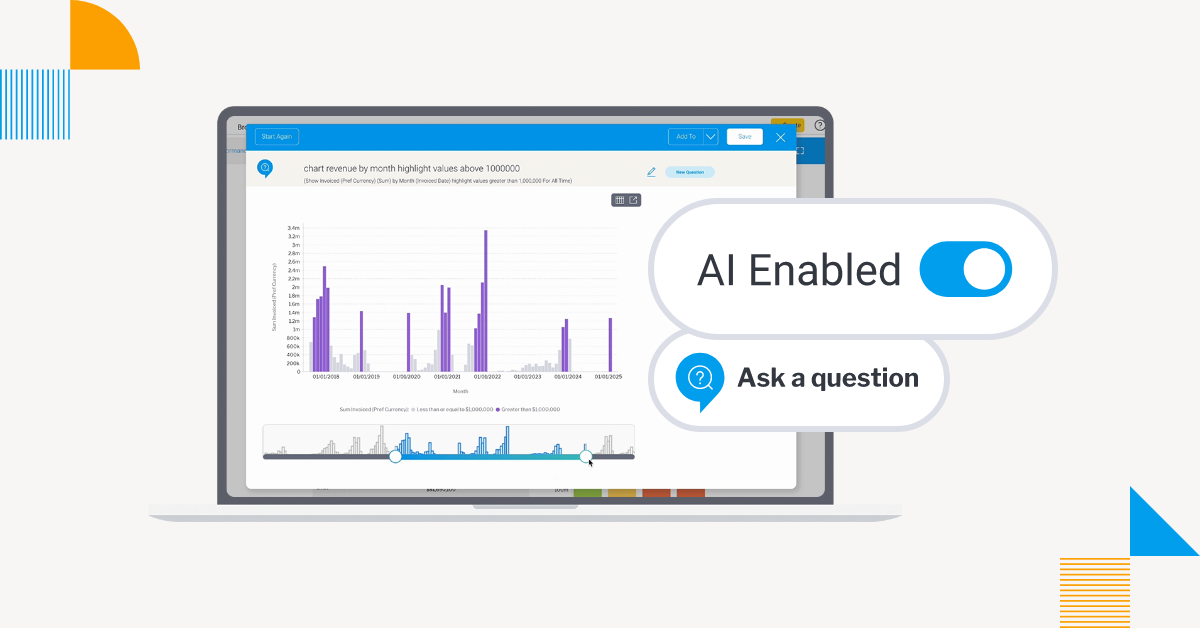
How does NLQ benefit self-service BI?
It’s clear that natural language query revolutionizes data analysis by providing real-time suggestions, improved accuracy, and seamless BI integration. Unlike traditional methods, it understands user intent, reduces errors, and makes insights more relevant.
Because of its user-friendly interface, NLQ tools are an effective way of enabling your personnel or customers at any skill level to explore their data without technical knowledge, which improves both speed and intelligence in decision-making processes. Yellowfin's NLQ solutions eliminate barriers to data querying and accessibility, therefore enabling businesses to use analytics effectively to achieve meaningful results.
Read more: How Guided NLQ Unlocks True Self-Service Analytics For Everyone
What does NLQ offer for software companies and enterprise analytics users?
Self service analytics need to match its users. Even though many software vendors have made BI easier with better user interfaces and streamlined processes, it still takes a lot of technical knowledge, data literacy and skill to simply use many of these tools.
For example, your Sales team may never build a report or chart just because some self-service dashboard tools are available. They may not have the time, skills, or the time to pick up the necessary knowledge. These options better suit data analysts or reasonably technical dashboard creators, who make complex reports daily.
NLQ can help change that, for non-technical users who might not be as well-versed with traditional BI solutions (i.e. don’t have the time), or who simply don’t get the same level of understanding others may from consuming a dashboard or a chart.
For Independent Software Vendors (ISVs): With NLQ available, software companies can further open up true self-service analytics for their customers without adding to the support burden of IT, by enabling the system to provide answers to data queries. As it stands today, the ISV has to help customize many reports for their customers or field consulting services to do so.
For enterprise: NLQ can help increase adoption of analytics platforms because more users will be able to use it, in particular much-neglected, non-technical business users. The system provides an easier way to execute their unique data query.
What is Yellowfin NLQ, and what are its features?
Yellowfin NLQ functions as a robust natural language query solution for enterprise companies and independent software vendors (ISVs). It enables both line-of-business and advanced analytics users to explore and analyze their data in a highly simplified manner. This system, split between two modes, Guided NLQ and AI NLQ, helps deliver a step-by-step data query structure and AI-assisted question formulation that maintains accurate and usable results.
The key characteristics of Yellowfin NLQ that enable users to explore their data through natural language queries include:
- AI-enabled exploration: AI NLQ allows Yellowfin users to type any question in a free-text search bar within Yellowfin and have it automatically structured with the correct syntax to generate more accurate, relevant answers in the form of rich data visualization or tabular reports.
Contextual query suggestions: The system presents Yellowfin users with contextual query ideas so that they can type, which helps in improving their questions and minimizing mistakes.
Seamless dashboard integration: Business users can embed insights generated from their use of Yellowfin NLQ into their dashboards, reports, and data stories, allowing them to quickly create reports without the need for manual formatting tasks.
Yellowfin NLQ ultimately emerges as an exceptional business solution for natural language querying thanks to its best-in-class features, advanced query generation technology, and introduction of generative AI and LLM technology with its AI NLQ mode.
You can learn more about Yellowfin NLQ, and see how AI NLQ works for yourself, in our demo walkthrough video, embedded below for your convenience.
How can Yellowfin NLQ benefit your business?
Through our exclusive AI NLQ and Guided NLQ features, Yellowfin delivers an advanced system that allows businesses to more easily access and analyze data and obtain efficient results and better insights. Users gain instant visual answers from system responses to their everyday language based questions. The system requires no advanced technical knowledge; hence, anyone within the organization can independently evaluate data.
The replacement of manual reporting with real-time question formulation and best practice generated insights allows everyone to unlock faster decision-making because users receive information instantly. The integration of Yellowfin NLQ with Yellowfin’s other BI tools, such as Assisted Insights, Stories, Present, and Signals, creates a robust data quering solution for self-service analytics that drives better choices
Some of the benefits are mentioned below:
- Easy data access and analysis through Guided NLQ and AI NLQ, requiring no advanced technical knowledge.
- Higher query accuracy with smart query suggestions and AI-assisted question structuring.
- Faster decision-making by replacing manual reporting with real-time question formulation and insights.
- Robust self-service analytics by integrating Yellowfin NLQ with Assisted Insights, Stories, Present, and Signals.
What sets AI NLQ apart from other natural language query models?
Most language processing solutions available on the market show vast differences in accuracy performance, usability features, and the ability to process elaborate queries. Basic search-based NLQ tools create inefficiencies in business processes and devalue the potential that the technology can bring to customers.
However, AI NLQ demonstrates superior capability over other older models as it supplies users with AI-enabled data query question suggestions and syntax structuring that enhance overall information accuracy and relevancy. The selection of an NLQ solution must center on context-sensitive and AI-enhanced models that can produce accurate, actionable outcomes instead of a traditional keyword search process, and that’s exactly what Yellowfin NLQ aims to provide.
Learn more: Not All Natural Language Query (NLQ) Models Are Created Equal

Why choose Yellowfin NLQ over Sisense Simply Ask?
“Simply Ask” from Sisense functions as an NLQ tool that provides users with data exploration through conversational interfaces. The search-based NLQ capability of Simply Ask reduces its capacity to handle intricate requests because of its limitations in data querying. Advanced business analytics requires a reliable tool like Yellowfin NLQ, but Simply Ask demonstrates limited capability due to its search-based approach.
Related comparison: Not All Natural Language Query (NLQ) Models Are Created Equal: Part 2 - Sisense Simply Ask
Comparing Yellowfin NLQ and Power BI Q&A
Power BI Q&A from Microsoft enables data users to query their information through natural language questions. The system demands users to form their questions using particular wording, which results in a user experience that falls below that of complete guidance. The AI-enabled NLQ functionality of Yellowfin provides real-time data query suggestions to users, which eliminates the need for multiple query rephrasings to achieve relevant insights.
Related topic: Not All Natural Language Query (NLQ) Models Are Created Equal: Part 3 - Power BI Q&A
Yellowfin NLQ vs. Tableau Ask Data
Users need to use proper search queries in Ask Data because it functions as a search-based NLQ tool. Yellowfin BI supplies all users with more appropriate question recommendations and dynamically structured question formulation via both its AI NLQ and Guided NLQ modes, which cut down data querying mistakes and enhance results precision.
Related comparison: Yellowfin Guided NLQ vs Tableau Ask Data: What's the Difference?
The growing pains of NLQ analytics - and its future
The capability for software systems to parse structured data and generate text and spoken language from it is far from a new technology or technique. Rather, the gradually increasing sophistication in its ability to generate truly relevant answers, has been.
But, as we’ve covered previously, many NLQ solutions (also called search-based BI tools) available in the market today have not delivered on expectations and promises, or failed to provide an effective solution for non-technical users to get answers, resulting in wasted potential.
Yellowfin’s new approach to NLQ with the release of AI NLQ means more business users can type a question about their data and gain instant, automated question structuring, question recommendations and helpful search parameters that ensure they can structure their query in the correct way, and receive relevant answers in the form of generated best practice data visualizations and dashboards. AI NLQ is wrapped up in a user-friendly interface that allows all members of a team to conduct seamless data querying, typing in a free-text search bar in natural language or generating a list of starting prompts, as they would in any other traditional search tool or Gen AI tool.
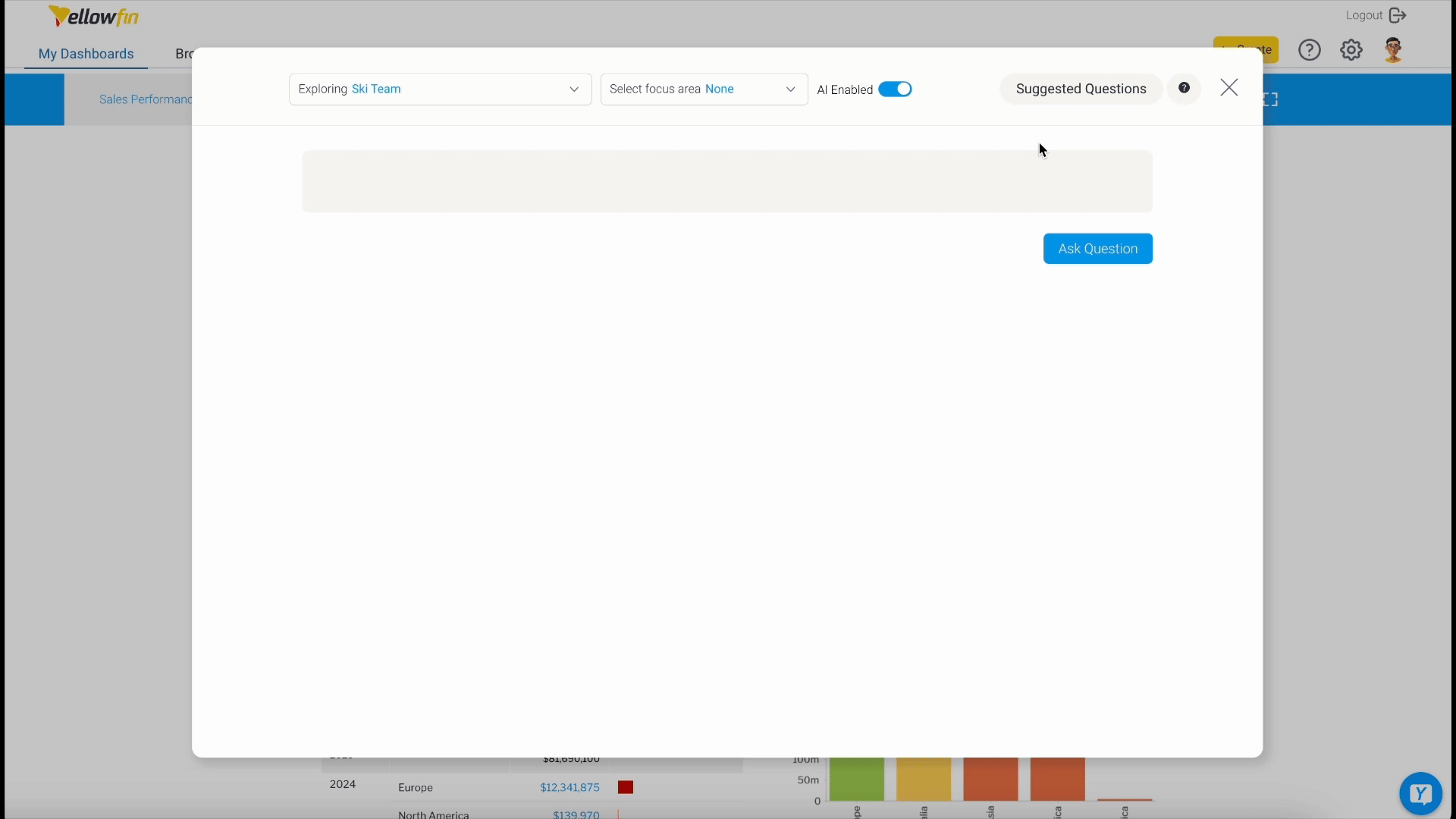
At Yellowfin, we believe in a different approach to leveraging the possibilities that NLQ can unlock. While everyone else is focusing on providing a search-based experience for their users, we see our AI NLQ feature and NLQ as a technology, working best as a guided experience. And this radically different approach is the way to go, to ensure self-service analytics is democratized for every user. To learn more about AI NLQ and Guided NLQ and how Yellowfin is changing the game with augmented, AI-powered analytics features, download our free whitepaper, Guided Natural Language Query: 5 Key Benefits of a Guided Approach to NLQ.
Final thoughts
Today's advancements in AI NLQ technology has clearly transformed data access by allowing users to ask questions of data in regular language and acquire accurate, helpful insights. Traditional search-based NLQ operates with accuracy problems, as well as difficulties answering complex data queries, which limits its success rate.
Yellowfin NLQ addresses search-based NLQ limitations through its structured query recommendation system, which produces accurate results within specific contexts. As companies continue to adopt AI-powered analytics, Yellowfin AI NLQ proves to be the decisive factor in providing data insights that are both accessible and usable
Frequently Asked Questions (FAQs)
What is the use case of NLQ?
Users can use natural language query (NLQ) within business intelligence (BI) tools to pose data-related inquiries through normal spoken language. The system makes data analysis more approachable because users without technical or SQL expertise can obtain insights without writing complicated statements.
What is the difference between NLP and NLQ?
Through NLP technology, machines receive the capability to process human language yet NLQ functions as a particular NLP solution for searching business information in analytic tools. The infrastructure managed by NLP enables the operation of both chatbots and voice assistants yet NLQ enables users to gain insights using their natural language for data queries
Why is NLP so powerful?
The capability of NLP to transform machine comprehension of human language produces powerful solutions such as chatbots, voice assistant,s and data analysis.
What is Natural Language Query (NLQ) in analytics?
Natural Language Query (NLQ) is a feature in BI tools that allows users to ask questions using everyday language instead of SQL. The system interprets the question, runs the query, and returns insights in the form of charts, reports, or visualizations.
How does NLQ make data analysis easier for non-technical users?
NLQ removes the need for technical knowledge or query-building skills. Users can simply type or speak a question, and the system automatically generates accurate answers — making analytics accessible to anyone in the organization.
What’s the difference between search-based NLQ and AI-powered NLQ?
Search-based NLQ relies on keyword matching and often struggles with complex queries. AI-powered NLQ understands intent, restructures the question properly, provides suggestions, and delivers more accurate, context-aware insights.
How does Guided NLQ improve the quality of user questions?
Guided NLQ helps users build better queries by offering smart suggestions and step-by-step prompts as they type. This guidance reduces errors, improves accuracy, and is especially helpful for users unsure of how to phrase their questions.
What are the benefits of implementing NLQ in a business intelligence platform?
NLQ boosts analytics adoption, speeds up decision-making, reduces reliance on analysts, and allows business users to explore data independently. It turns complex analysis into a simple, conversational experience.
What are common real-world examples of NLQ in use?
Examples include questions like:
- “What were our total sales last month?”
- “Top 10 performing products?”
- “Compare Q1 and Q2 revenue.”
- “Which region had the highest customer growth?”
These reflect everyday business questions that NLQ can answer instantly.
Why do some NLQ tools produce inaccurate results?
Inaccurate results often come from keyword-only matching, poor data structure, or limited understanding of user intent. Advanced NLQ tools use AI and metadata to generate precise answers and avoid misinterpretation.
What should organizations consider before adopting NLQ?
Key considerations include data readiness, metadata quality, governance, user data literacy, and whether the solution integrates well with existing BI workflows. Good preparation ensures NLQ works accurately and consistently.
How does AI enhance Natural Language Query?
AI enhances NLQ by structuring vague questions, understanding context, generating recommended questions, and returning best-practice visualizations. It improves accuracy and makes the experience more interactive and intuitive.
Can NLQ replace traditional dashboards and reports?
NLQ doesn’t replace dashboards; it complements them. Dashboards are great for monitoring known metrics, while NLQ helps users explore new questions on the fly. Together, they create a complete self-service analytics environment.
The future of NLQ is AI, not search-based
Learn why traditional search-based NLQ just hasn't lived up to expectations, and how a new guided approach to NLQ will open up analytics for everyone with Yellowfin's AI NLQ feature.
